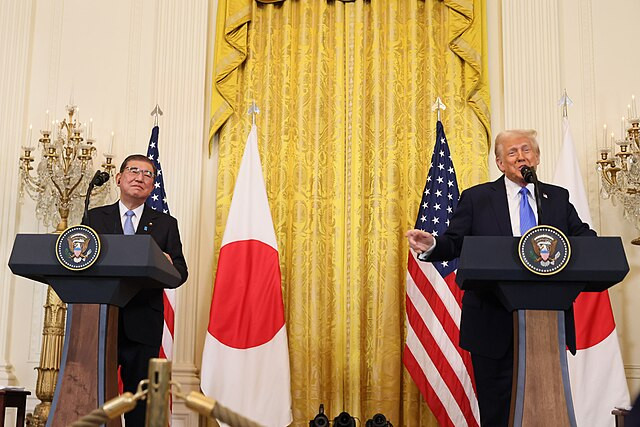President Donald Trump on Tuesday announced what he described as a "massive" new trade agreement with Japan, setting 15% reciprocal tariffs on Japanese exports to the United States and outlining an investment framework that includes $550 billion in Japanese capital flowing into the U.S. economy.
"We just completed a massive Deal with Japan, perhaps the largest Deal ever made," Trump said in a post on Truth Social. "This Deal will create Hundreds of Thousands of Jobs." Trump further claimed the United States "will receive 90% of the profits," although no official term sheet or explanation of profit-sharing mechanics was released.
The agreement marks a significant breakthrough in talks that had previously been described by Trump as "tough." During a reception with Republican lawmakers in the East Room, the president reiterated, "I just signed the largest trade deal in history... with Japan." He emphasized the bilateral nature of the deal, stating, "Japan will open their Country to Trade including Cars and Trucks, Rice and certain other Agricultural Products."
The Japanese government appeared to welcome the announcement. Ryosei Akazawa, Japan's chief trade negotiator, posted on X: "#Mission Accomplished," and offered "heartfelt thanks to everyone involved," according to a translation of his message.
According to Trump, Japan's auto tariffs will be reduced from 25% to 15%. NHK reported that Japanese automobile exports to the U.S.-a cornerstone of Japan's export economy-declined by 26.7% in June, following a 24.7% drop in May. Automobiles, including cars, buses, and trucks, accounted for 28.3% of Japan's total exports in 2024.
The U.S. imported $148 billion in goods from Japan in 2023, making the country America's fifth-largest source of imports, per Commerce Department data. Top imports included cars, auto parts, construction equipment, and industrial machinery. In contrast, U.S. exports to Japan totaled $80 billion, led by oil and gas, pharmaceuticals, and aerospace goods.
The deal also includes an additional liquified natural gas (LNG) agreement, Trump said Tuesday, though details were not immediately disclosed. "We have [a] Europe [deal] coming in tomorrow," he added.
The trade breakthrough arrives just weeks after Trump sent a letter to Japanese Prime Minister Shigeru Ishiba threatening to impose 30% tariffs by August 1, raising concerns in Tokyo and exacerbating political pressure on Ishiba's ruling coalition, which recently lost its majority in the upper house.
HSBC noted this week that "For Prime Minister Ishiba, a favourable U.S. trade deal could help stave off a no-confidence motion or internal challenge from the LDP [Liberal Democratic Party]." Following his party's electoral setback, Ishiba told reporters he would assess the tariff negotiation outcome before deciding whether to remain in office, according to Japanese outlet Yoimuri.
The U.S. previously paused a 24% tariff on Japanese imports in April, replacing it with a 10% baseline rate. The new deal appears to stabilize the tariff regime while addressing contentious issues, such as rice market access. Trump has repeatedly criticized Japan's rice import policies, writing in June: "They won't take our RICE, and yet they have a massive rice shortage."
U.S. Census Bureau data shows Japan purchased $298 million worth of American rice last year and $114 million from January to April this year. A 2021 USTR report noted Japan's "highly regulated and nontransparent system" hindered meaningful access for U.S. rice exporters.
The deal follows an earlier 2019 U.S.-Japan trade agreement that expanded tariff-free trade and comes amid broader efforts by the Trump administration to pressure allies, including Japan, to reduce trade dependence on China.
Japan also maintains leverage as the largest foreign holder of U.S. Treasuries, with $1.1 trillion in American debt, a strategic consideration as the U.S. confronts mounting fiscal deficits. Treasury Secretary Scott Bessent, who met with Ishiba in Tokyo last week, said on X: "A good deal is more important than a rushed deal."





